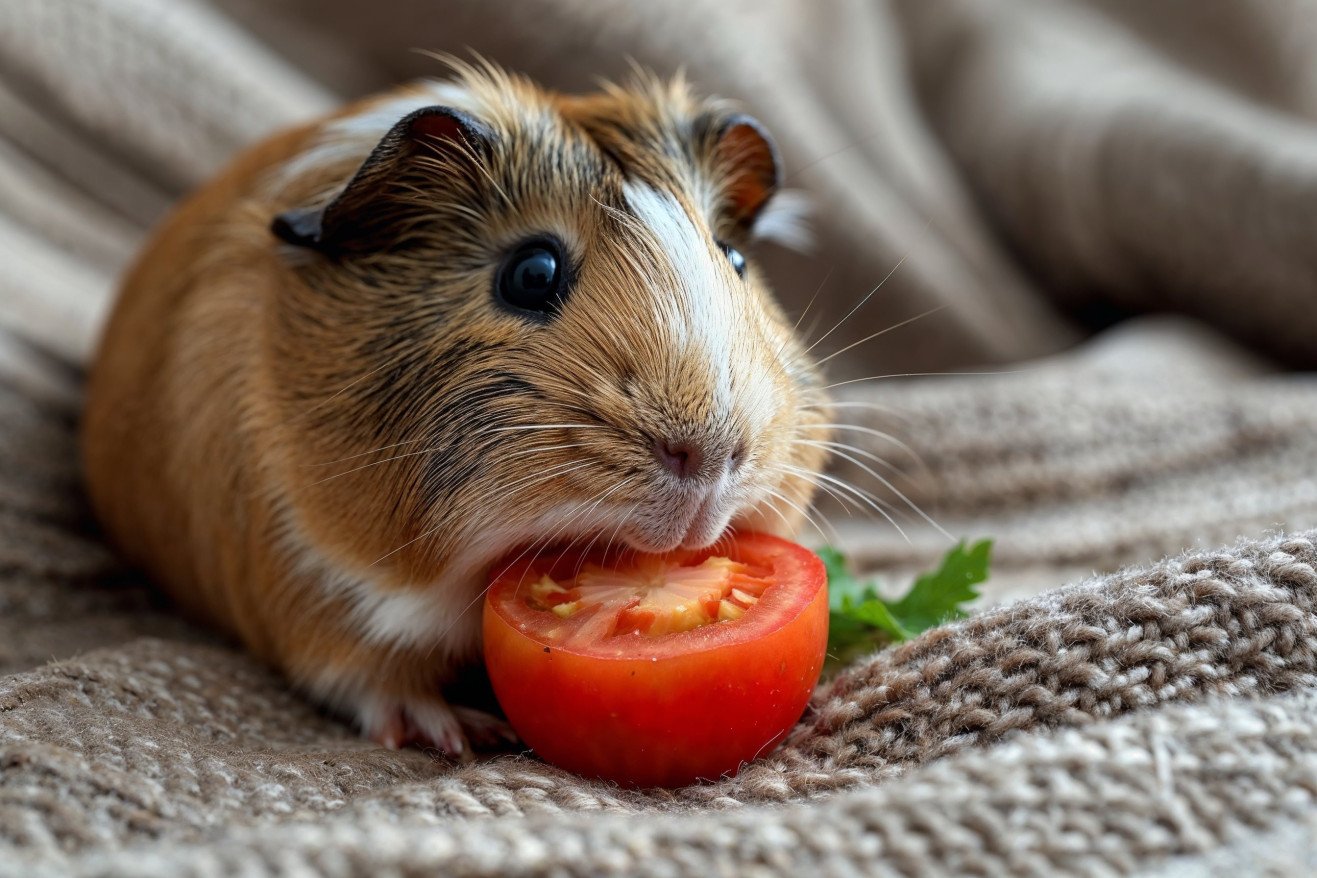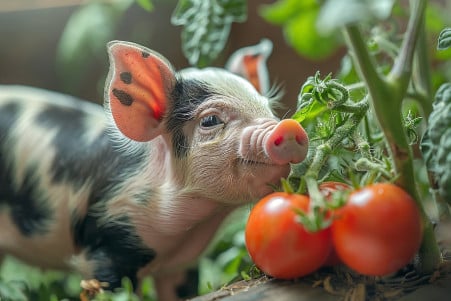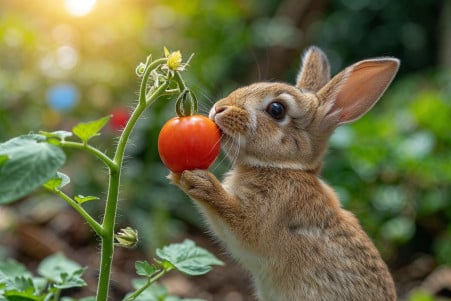Can Guinea Pigs Eat Tomatoes? A Guide to Safe Snacking
23 January 2024 • Updated 28 January 2024

Tomatoes are full of vitamins and minerals, but can you share this healthy snack with your guinea pig? The answer is yes, guinea pigs can eat red tomatoes in small amounts because they contain Vitamin C.
However, you should stay away from green tomatoes and the leaves and stems of the tomato plant, which are poisonous. You should also be careful not to give your guinea pig too many tomatoes, as the acidity can cause mouth sores and other digestive issues.
In this article, we will take a deep dive into the world of veterinary nutrition and animal care to learn about the dietary requirements of guinea pigs. We will review scientific research, advice from vets, and nutritional standards for these little herbivores.
This will give us the information we need to learn about the place of tomatoes in a guinea pig’s diet, how often and how much they can eat, and the impact tomatoes have on their health and happiness.
Can guinea pigs eat tomatoes?
The Bounty of Benefits: Tomatoes in a Guinea Pig’s Diet
Tomatoes provide a wealth of benefits for guinea pigs, and many of these are due to the vitamins and minerals they contain. For example, ripe tomatoes are an excellent source of Vitamin C, which is especially important for guinea pigs since they can’t make this essential nutrient in their bodies.
As PetHelpful notes, guinea pigs need to get enough Vitamin C in their diet every day to avoid scurvy and maintain their overall health. Tomatoes are also a good source of potassium, which is important for maintaining the health of a guinea pig’s heart and muscles.
Meanwhile, tomatoes are especially important in a guinea pig’s diet because of their high water and fiber content, which can help with hydration and digestion. In addition, Guinea Pigs Australia points out that tomatoes are a good source of Vitamin K, which is important for bone health, and folate, which is important for tissue growth. This is especially important since many of the foods that guinea pigs eat, like hay, don’t contain Vitamin C.
That said, it’s important to make sure that tomatoes are part of a balanced diet. As Vet Explains Pets explains, tomatoes should make up no more than about 10 percent of a guinea pig’s diet to make sure that they’re getting all of the nutrients they need.
To make sure that you’re introducing tomatoes safely, start by giving your guinea pig a small piece and then watching them for the next 24 hours to make sure that they don’t have any adverse reactions.
This will help you make sure that you’re adding something positive to their diet, which is already rich in a variety of nutrients and fiber.
Tomato Alert: Know the Dangers of Feeding Tomatoes to Guinea Pigs
While guinea pigs can eat tomatoes and benefit from their nutritional value, there are some dangers to be aware of. The biggest danger is tomatine, a toxic substance found in the green parts of the tomato plant, including the leaves and stems, and in unripe tomatoes. A Guinea Pigs Australia article reports that if guinea pigs eat these parts of the tomato, they can experience tomatine poisoning, which can lead to severe health problems.
Meanwhile, The Dodo warns that guinea pigs that eat too many tomatoes can develop acidic issues, which can lead to mouth sores and digestive problems. Drooling, a loss of appetite, and mouth scabs can be signs of a guinea pig’s negative reaction to tomatoes or other foods that are high in oxalic acid.
To safely feed tomatoes to your guinea pig, start by giving them a small piece of a ripe tomato that doesn’t have any green parts and see how they react. Central Victoria Hay recommends that you continue to make sure that your guinea pig has a well-rounded diet and that you keep tomatoes (and other fruits) to less than 10% of their diet.
It’s important to pay attention to your guinea pig’s reaction to new foods and make sure that you adjust their diet as needed to make sure that they’re healthy and happy.
How to Make Sure Your Guinea Pig Has a Healthy Diet
Knowing what guinea pigs eat is important for their overall well-being. According to the National Research Council’s Nutrient Requirements of the Guinea Pig, guinea pigs require a diet that is high in fiber, and this is best met by providing unlimited amounts of high-quality hay. Not only does hay provide the fiber needed for proper digestion, but it also helps guinea pigs keep their teeth from growing too long.
Another important thing to know about guinea pig nutrition is that guinea pigs can’t produce their own Vitamin C, so it needs to be included in their diet. Vitamin C is an essential nutrient that can be found in leafy greens and other vegetables, and it helps prevent scurvy and other health problems.
To ensure guinea pigs get enough Vitamin C, the RSPCA recommends feeding them a daily diet that includes fresh vegetables and grass-based pellets that have been fortified with Vitamin C.
In general, guinea pigs should eat a diet that includes hay, fresh vegetables, a small amount of pellets, and some fruit. A varied diet will help ensure that guinea pigs get all the nutrients they need to support their immune systems, help their bodies repair cells, and more.
While tomatoes do contain Vitamin C and water, they should be fed to guinea pigs as an occasional treat rather than a regular part of their diet.
Oxalic Acid in Your Guinea Pig’s Diet
Oxalic acid is found in many plants, including tomatoes. It is a natural compound that is considered an anti-nutrient because it binds minerals and inhibits their absorption, potentially leading to nutrient deficiencies. According to Medical News Today, while oxalic acid in low amounts is generally safe, in high amounts it can contribute to the formation of kidney stones, especially calcium oxalate stones, which are a risk for both people and guinea pigs.
In guinea pigs, excessive oxalic acid intake can lead to the formation of kidney stones and can also interfere with the absorption of important nutrients like calcium. A 2023 study by M. M. Rahman in the Journal of Animal Physiology and Animal Nutrition found that non-ruminants, including guinea pigs, may be more susceptible to oxalate than ruminants because they lack the gut bacteria that degrade oxalate.
To help offset oxalic acid intake, it’s important to make sure that guinea pigs are getting enough calcium in their diet. Calcium can bind to oxalate and prevent it from being absorbed, according to a study published on PubMed. This means that feeding guinea pigs calcium-rich foods in combination with oxalate-rich foods like tomatoes may help lower the potential risks.
While veterinary research hasn’t yet determined the exact safe and unsafe levels of oxalic acid for guinea pigs, it’s important to use caution. Keeping oxalic acid intake low by offering tomatoes as an occasional treat instead of a regular part of the diet can help prevent problems while still allowing guinea pigs to enjoy the nutritional value of this tasty fruit.
Creating a Healthy Menu: Fruits and Vegetables for Guinea Pigs
It’s important to strike a balance between variety, safety, and nutritional value when it comes to feeding guinea pigs fruits and vegetables. The Humane Society of the United States notes that guinea pigs should be fed a selection of fresh vegetables and the occasional fruit in addition to their staple diet of hay and pellets.
Not only do these fresh foods offer important vitamins and minerals, but they also help guinea pigs meet their daily water intake requirements.
In terms of other guinea pig-friendly fruits and vegetables, tomatoes are similar to bell peppers and broccoli in that they are high in Vitamin C and can be fed daily. However, fruits and some vegetables that are high in sugar or oxalates should be fed in moderation to avoid health problems like calcium oxalate stones. For example, strawberries and spinach are high in oxalates and should be fed in moderation.
The RSPCA suggests that new fruits and vegetables should be introduced to guinea pigs slowly to avoid digestive issues. Start by feeding them a small amount and, if they don’t have any problems, work up to the recommended serving size.
In the case of tomatoes, this would be a small slice once or twice a week. It’s also important to remember that fruits are treats and should make up no more than 10% of a guinea pig’s diet.
If you follow these rules, you can make sure that your guinea pig has a healthy, varied diet that supports their overall health and happiness.
Final Thoughts on Can Guinea Pigs Eat Tomatoes?
By feeding your guinea pig tomatoes in moderation and making sure they are ripe, you can give them a healthy and colorful treat. Tomatoes are a great source of Vitamin C and other important nutrients that can help support your guinea pig’s overall health. However, it’s important to remember that unripe tomatoes and the leaves and stems of the tomato plant contain tomatine, which is toxic to guinea pigs.
As mentioned, the key to feeding your guinea pig tomatoes safely is to do so in moderation. It’s also important to pay attention to your guinea pig’s reaction to tomatoes, as each guinea pig may respond differently to a new food.
To ensure that you’re feeding your guinea pig tomatoes in a way that’s safe and healthy, make sure to follow these dietary recommendations and consult with a vet who knows your guinea pig’s medical history if you have any questions.
By knowing the benefits and risks of feeding your guinea pig tomatoes, you can make sure that this fruit is a healthy addition to their diet rather than a danger. This will help you support your guinea pig’s health and well-being and ensure that they are happy and healthy under your care.


